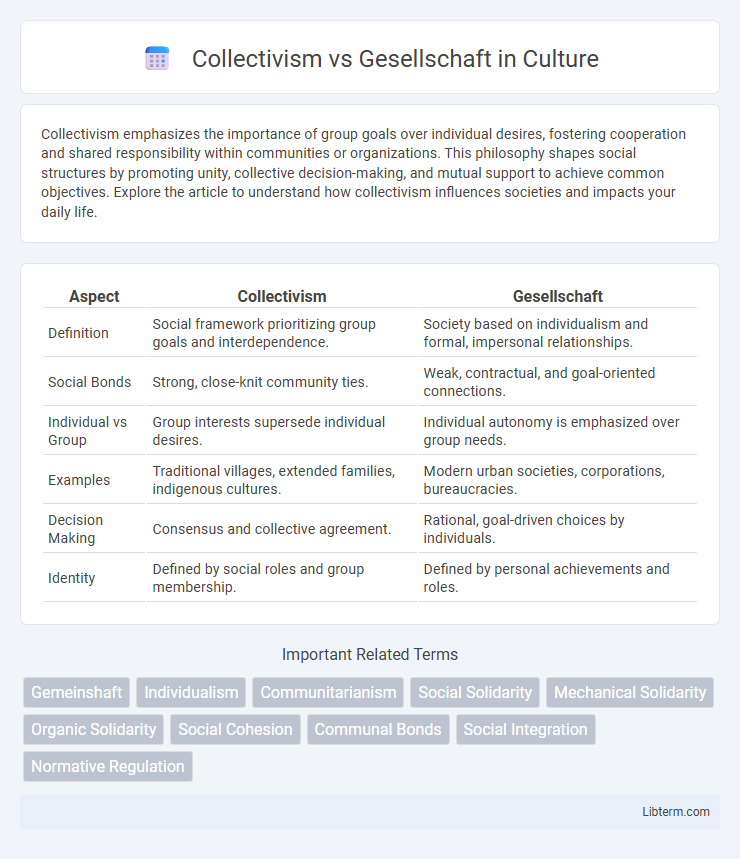Collectivism emphasizes the importance of group goals over individual desires, fostering cooperation and shared responsibility within communities or organizations. This philosophy shapes social structures by promoting unity, collective decision-making, and mutual support to achieve common objectives. Explore the article to understand how collectivism influences societies and impacts your daily life.
Table of Comparison
| Aspect | Collectivism | Gesellschaft |
|---|---|---|
| Definition | Social framework prioritizing group goals and interdependence. | Society based on individualism and formal, impersonal relationships. |
| Social Bonds | Strong, close-knit community ties. | Weak, contractual, and goal-oriented connections. |
| Individual vs Group | Group interests supersede individual desires. | Individual autonomy is emphasized over group needs. |
| Examples | Traditional villages, extended families, indigenous cultures. | Modern urban societies, corporations, bureaucracies. |
| Decision Making | Consensus and collective agreement. | Rational, goal-driven choices by individuals. |
| Identity | Defined by social roles and group membership. | Defined by personal achievements and roles. |
Introduction to Collectivism and Gesellschaft
Collectivism emphasizes the importance of group goals, social cohesion, and shared responsibilities among community members, where individual interests are often subordinate to the collective well-being. Gesellschaft, a concept introduced by sociologist Ferdinand Tonnies, refers to society characterized by impersonal, formal, and contractual relationships prioritizing individualism and self-interest in urban and industrial contexts. Understanding the contrast between collectivism and Gesellschaft is essential for analyzing social structures, cultural norms, and the dynamics of community versus individualistic societies.
Defining Collectivism: Core Principles
Collectivism centers on the primacy of the group over individual interests, emphasizing shared goals, mutual support, and social cohesion as key principles. It advocates for collective responsibility, where resources and decision-making are distributed to benefit the community as a whole. This contrasts with Gesellschaft, which prioritizes individualism, formal relationships, and personal achievement within structured, impersonal societies.
Understanding Gesellschaft: Key Characteristics
Gesellschaft is characterized by formal, impersonal relationships often found in modern urban societies where interactions are driven by individual self-interest and contractual agreements. Social bonds in Gesellschaft are typically weak, emphasizing efficiency, rationality, and specialization over emotional connections and communal values. This type contrasts sharply with collectivist societies by prioritizing individual autonomy and social roles defined by legal norms rather than traditional or kinship ties.
Historical Roots of Collectivism
Collectivism's historical roots trace back to early communal societies and indigenous cultures emphasizing shared resources and mutual obligations, contrasting sharply with Gesellschaft's basis in modern industrial and capitalist societies centered on individualism and contractual relationships. Theories by Karl Marx and Emile Durkheim illustrate collectivism's foundation in class solidarity and social cohesion, arising as a reaction to the alienation produced in Gesellschaft-type urban environments. This historical tension reflects evolving social structures where collectivism prioritizes group identity and collective welfare over the impersonal, transactional nature characteristic of Gesellschaft interactions.
Evolution and Context of Gesellschaft
Gesellschaft, emerging from Ferdinand Tonnies' sociological framework, reflects modern societal organization characterized by impersonal, goal-oriented relationships rather than the intimate bonds typical of Gemeinschaft. This evolution from collectivist community structures to Gesellschaft signifies a shift driven by industrialization, urbanization, and economic rationality, fostering social interactions based on contractual agreements and individual self-interest. Gesellschaft contexts emphasize formal institutions, legal systems, and market-driven interactions, highlighting the transformation toward complex, large-scale societies dependent on specialized roles and indirect social ties.
Social Dynamics: Collectivism vs Gesellschaft
Social dynamics in collectivism emphasize strong group cohesion, shared values, and mutual support, fostering interdependence among community members. Gesellschaft relationships prioritize individual goals, formal contracts, and impersonal interactions, reflecting a society structured around self-interest and efficiency. This contrast influences social organization, communication patterns, and conflict resolution strategies within different cultural contexts.
Individual Rights within Collectivist Societies
In collectivist societies, individual rights are often subordinated to the needs and goals of the group, prioritizing social harmony and community welfare over personal autonomy. This contrasts with Gesellschaft, where individual rights and personal freedom are more prominently protected and emphasized within impersonal, formal social structures. The balance between collective responsibility and individual liberties remains a critical tension influencing policy and social dynamics in collectivist contexts.
Economic Structures in Gesellschaft Systems
Gesellschaft economic structures emphasize formal, contractual relationships and impersonal market transactions driven by individual self-interest and profit maximization. These systems rely on specialized divisions of labor, bureaucratic organizations, and legal frameworks to regulate commerce and protect property rights. Efficiency, competition, and innovation are prioritized over communal welfare, shaping modern capitalist economies and corporate environments.
Modern Examples: Collectivism and Gesellschaft in Practice
Modern examples of collectivism are evident in Scandinavian countries like Sweden and Norway, where social welfare systems and community-oriented policies emphasize group well-being over individual success. Gesellschaft is reflected in urban centers such as New York City and Tokyo, where relationships are often transactional, and social ties prioritize individual goals and economic efficiency. These models highlight how societal organization influences cultural values and social interactions in contemporary contexts.
The Future of Social Organization: Reconciliation or Conflict?
The future of social organization lies in balancing collectivism's focus on community and shared values with Gesellschaft's emphasis on individualism and formal institutions. Emerging trends in digital connectivity and global challenges push societies toward hybrid models that integrate cooperative networks with structured governance frameworks. This reconciliation aims to harness collective responsibility while preserving personal autonomy, potentially reducing conflict inherent in purely communal or individualistic systems.
Collectivism Infographic

 libterm.com
libterm.com